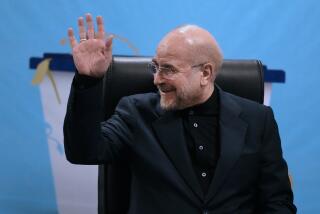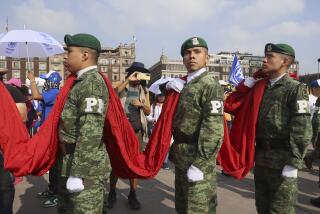Electioneering Heats Up Despite Rebel Attacks
- Share via
BAGHDAD — Despite continuing violence, Iraq’s lively and colorful political campaign season was in full swing Saturday, with candidates using the airwaves and the streets to grab voters’ attention before Dec. 15 parliamentary elections.
The campaigning has included rowdy demonstrations, such as a downtown rally Saturday morning in support of radical Shiite cleric Muqtada Sadr and catchy radio jingles: “Come and salute our list,” a singer bellows during one ad for former interim Prime Minister Iyad Allawi. “All parties are united on our list.”
To create buzz, the newly formed Iraq Future Gathering ticket has organized youth soccer tournaments, and Iraqi Christians have tapped a well-known television actor to star in Assyrian-language ads.
But the campaign season has been hampered by bloodshed, including the drive-by shootings Saturday of four workers putting up election posters, the first known attack of the campaign season. One of the workers was killed, police said, and the other three were injured.
A wave of violence marred the run-up to Iraq’s Jan. 30 transitional assembly election, with more insurgent attacks launched on the day of the vote than nearly any other day since the toppling of Saddam Hussein’s government in 2003.
Iraqi and U.S. officials hope that widespread participation by the nation’s rebellious Sunni Arab minority in the election might stanch the violence. But the insurgents have been relentless.
A suicide car bomber Saturday rammed into a crowd at a gas station near the mostly Sunni Arab city of Samarra, killing at least five and injuring 16. Another car bomb in Baghdad’s upscale Qadisiya district injured four civilians. Insurgents on Friday killed a U.S. soldier during combat operations in western Iraq, the military announced Saturday.
In Iraq’s south, sectarian strife continued with the reported killing of a Sunni cleric after his abduction by men suspected of belonging to Iraq’s Shiite Muslim-dominated security forces. The body of the cleric, a member of the Muslim Scholars Assn., a Sunni group, was found Saturday afternoon near the British war cemetery in the city of Basra.
The steady violence, which drove Iraqi politicians off the campaign trail for the last assembly vote, hasn’t stopped spirited efforts to galvanize voters for the upcoming election.
On campaign posters throughout the capital, Allawi is touted as “the man of the current era, the man of the future.” Ads for onetime Pentagon protege Ahmad Chalabi say, “We liberated Iraq and we will build it together.”
Each party or bloc is assigned a three-digit number on the ballot, and the Shiite-dominated United Iraqi Alliance was lucky enough to draw the easily-remembered “555.” The alliance also has resurrected the lighted-candle symbol it used for the last election. The four campaign workers who were shot Saturday afternoon were putting up signs proclaiming “555.”
In addition to the ebb and flow of violence, several other factors will influence the election campaign.
American officials housed in Baghdad’s mammoth U.S. Embassy insist they will show no preferences for candidates and will cooperate with whatever government Iraqis elect. But U.S.-funded efforts to promote American political ideals continue.
Al-Hurrah, the U.S.-financed Arabic-language satellite channel, will soon air a series of American-style televised debates between some of the candidates. Contenders also have begun to take advantage of free two- or three-minute slots on Al-Hurrah to introduce themselves to voters.
U.S.-funded organizations that promote American-style political culture, such as the National Democratic Institute, have provided parties with campaign posters, Iraqi political party officials said.
Mosques also will play a role in the campaign. Shiite political parties ascended to power in the last election, which selected a transitional National Assembly, on the endorsement of Grand Ayatollah Ali Sistani, Iraq’s preeminent Shiite leader.
Sistani has vowed to stay out of this election, which will choose an assembly to serve a full term. But one of his colleagues, Ayatollah Bashir Najafi, has endorsed the United Iraqi Alliance list, Najafi’s son said.
In contrast to the January elections, which Sunnis mostly boycotted, the community’s preachers are urging the faithful to abandon violence and vote, though without endorsing specific tickets.
“We are on the doorstep of an election battle,” cleric Sheik Mahmoud Sumaidaie told worshipers Friday at Baghdad’s Umm Qura Mosque. “Don’t give your voices to those you know kill Iraqis and divide Iraq.”
Iraq’s new electoral system also will shape much of the campaigning. In the Jan. 30 election, candidates competed on a single nationwide ballot. But this time, elections will be held within 18 provincial districts, each with an allotted portion of the 275-seat legislature, letting parties tailor campaigns to local tastes.
The system also includes a 45-seat national district that will help geographically scattered minorities maximize their clout. For example, the Kurdish coalition has concentrated its campaign efforts on locales outside the three-province Kurdish autonomous region in the north where it expects to sweep the vote.
“We are organizing meetings and conferences in the regions that contain big populations of Kurds in Baghdad and in southern and eastern provinces,” said Mohammed Amin, the head of the Baghdad branch of the Kurdistan Democratic Party, a major Kurdish political group.
Sunnis, after turning out in numbers as high as 80% in the Oct. 15 referendum on the nation’s new constitution, hope for a repeat performance in provinces they dominate. They narrowly missed defeating the constitution, which they generally despise, and now see a chance to change the charter by increasing their numbers in parliament.
Hanna Sheikhly, a member of the Sunni nationalist Patriots slate, says her party will campaign in western Iraq regardless of clashes between insurgents and U.S. military forces.
“Despite the danger,” she said, “we will go to educate people and encourage them to participate.”
Times staff writers Raheem Salman, Shamil Aziz, Saif Rasheed and Caesar Ahmed in Baghdad and special correspondent Saad Fakhrildeen in Najaf and a special correspondent in Samarra contributed to this report.
More to Read
Sign up for Essential California
The most important California stories and recommendations in your inbox every morning.
You may occasionally receive promotional content from the Los Angeles Times.










